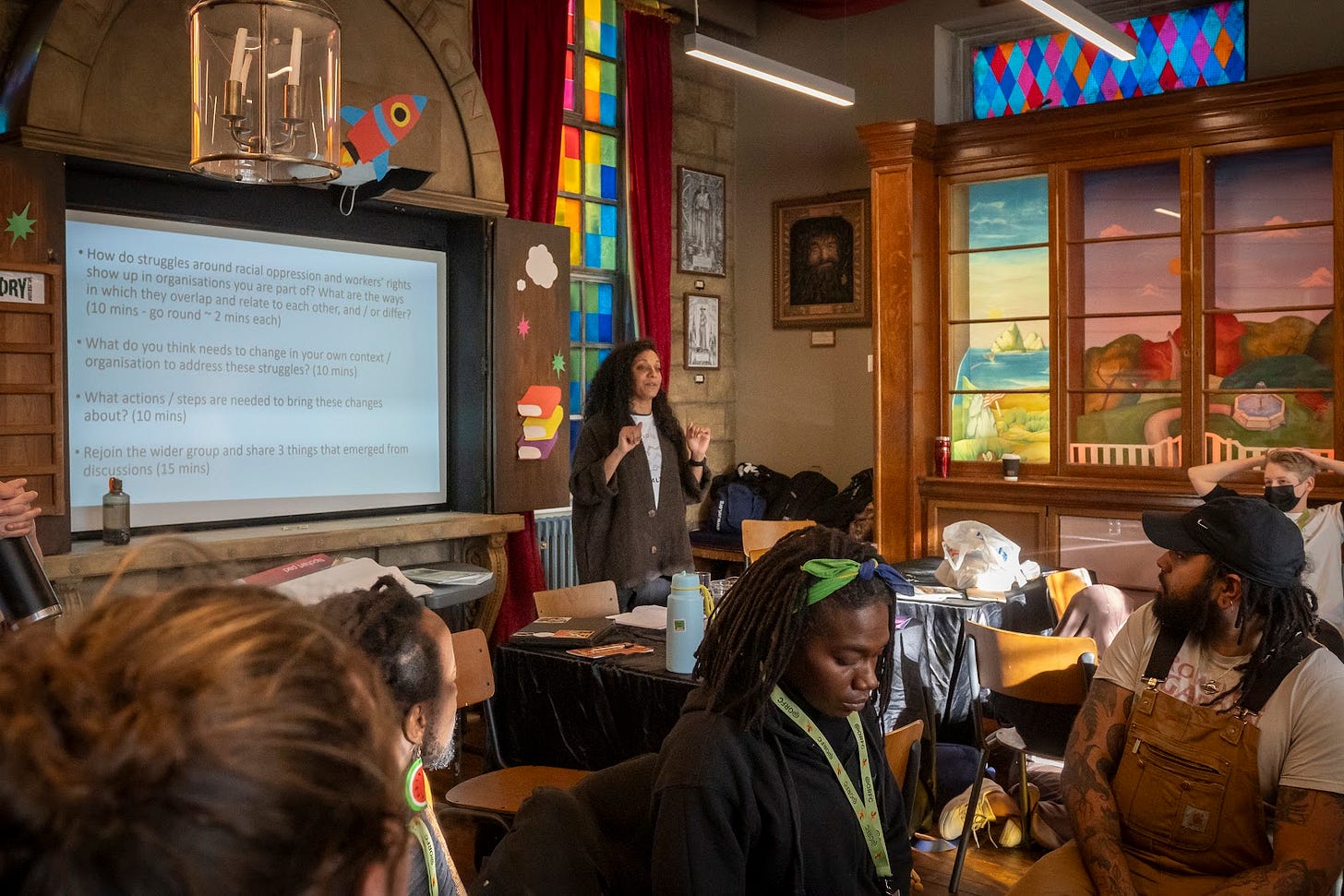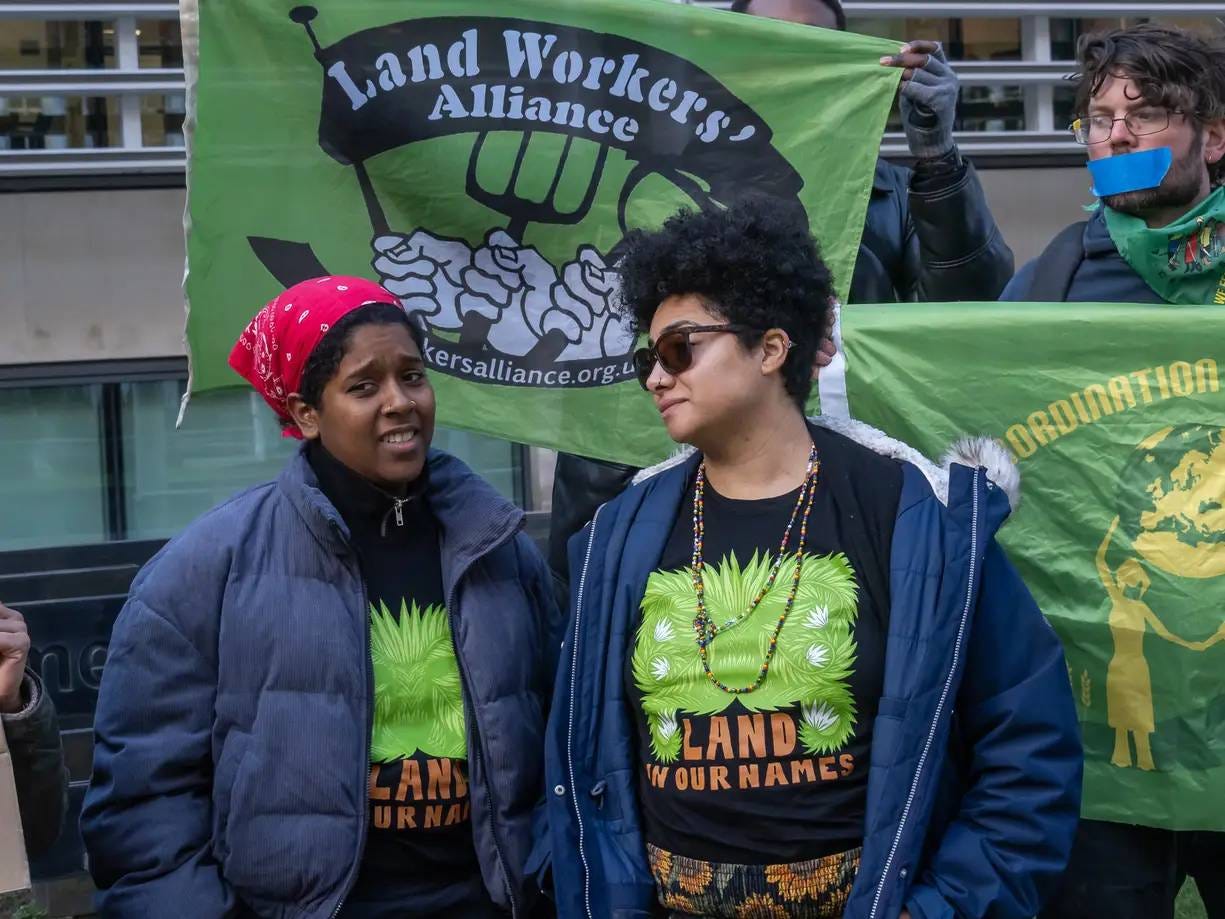It feels like an age since January’s Workers’ Rights and Racial Justice Across Land Trades panel and workshop at the 2025 Oxford Real Farming Conference (ORFC). Many of us need significant downtime after this big event in the progressive farming world, and that was no less necessary this year. Just in time for International Worker's Day, Josina finally found time to reflect on the session, as well as share wishes for the Justice Strand 2026 (and planned post-ORFC BPOC caucus), which were shaped by some of the emerging topics.
LION collective members Sam and Marcus shared a panel with three Solidarity Across Land Trades (SALT) organisers & researchers. The purpose of this session was to examine the fundamental interconnection between workers’ struggles and racial inequity, inviting attendees to reflect and co-create strategies for transformative justice in the workplace. Check out the session’s recording here.
Imagine the feeling of finding a missing piece of a jigsaw puzzle under the sofa? That’s what hearing from all the panellists together felt like to me. Sticking with the jigsaw analogy, this session blew the dust off this most important puzzle piece; that which reveals the interconnections between cheap food, racial discrimination and poor working conditions. That the plantationocracy left the colonial legacy of extraction and exploitation of peoples’ labour and of the land. Revealing ableism and disability justice as integral to addressing a life spent doing manual labour.
It’s so very easy to love SALT folk, and feel warmed by how they care for each other in their organising. Meeting their extraordinary backer Sarah Woolley (General Secretary of the Bakers Food and Allied Workers Union) was a treat more glorious than the (unionised) Greggs sausage roll she encouraged us to buy. The session brought to mind the Cornel West quote “justice is what love looks like in public”. Organising for workers’ rights could be one of the deepest manifestations of care for others. It was hard, at times, hearing of the hurt and harm that had brought our comrades to organise as SALT, especially when juxtaposed against the perception of an innate good in the agroecological sector. I was pleased to hear SALT organisers are doing additional training to upskill and increase capacity for member solidarity, health and safety, casework etc to support those employed by others in land work, especially those who are the most vulnerable.
The ORFC SALT speakers brought such valuable contributions to their sessions, and there is a fortitude in trade union organising that will continue to send ripples across the sector in the years to come.
If you are employed as a land worker please consider joining SALT here.
The definition of class used in the LION x SALT session helpfully bypasses the perceptions of an agroecology sector populated only by middle-to-upper class (usually white) people who can afford low pay or unpaid traineeships. This obfuscates differing relationships to capital, property, land and assets. We, alongside SALT, navigate tensions and ideological differences. Having the below definition grounds us for honest dialogue about power within our movements.
Our understanding of class is based on an economic relationship to capital (money/ assets [like land, property and equipment] / status) and the means of production. It describes a system of inequality produced and upheld by racial capitalism.
The ruling class (1% of the population) own more than 50% of the land in England, with 30% of land in the hands of the aristocracy and gentry (Who owns England?, 2019); they make money from being rich, from crises, extraction, colonialism and growing inequality.
The working class do not own significant assets or capital, so instead must sell their labour to survive within a grossly unequal system. Class intersects with other forms of marginalisation such as race, disability, gender, visa/ migration status, sexuality etc. resulting in multiple forms of oppression, division and also solidarity. Inequality and the ways work is organised are shifting fast, making it harder for workers to organise, build power and class consciousness.
Within the agroecological sector, there are land owners, business owners, managers and workers - each of these have different interests and different class positions. We would argue that not enough work / thinking has been done to recognise the ways class shows up within our sector, making it harder to challenge power, unionise, resist oppression and win better conditions for workers. We see this as a key element in creating systemic and revolutionary change.
We highly recommend reading SALT’s Burnt Out, Overworked & Underpaid report. It was concerning that of the 46 workers surveyed, Black women were the most likely to report having experienced discrimination. Though, given previous LION reports, it was perhaps-unsurprising to read land workers’ experiences of sexism, racism, classism, homophobia and ableism. Quotes from the report’s participants demonstrate the vulnerability of our community members engaging in the sector:
“They explain how race and class dictates who is welcome in agroecological spaces, with participation confined to those who conform to a white, middle-class aesthetic.”
“Wealth and whiteness were intertwined, with white workers from middle or upper-class origin identified as the most able to succeed”
The LION collective were proud to support the emergence of the Justice is not Seasonal (JINS) Campaign at ORFC. LION stands firmly in solidarity with migrant workers and against forced labour, imperialism and exploitation. The majority of the collective attended their January demonstration outside the Home Office and seminar
Sadly, we have a long way to go before meeting the essential demands of this campaign, which includes an end to forced labour and exploitation on farms. But (migrant) workers’ rights sit alongside reparations / abolition / care as imperative values to integrate with rights struggles in wider food and farming movements. It was fantastic that the JINS workers had such a presence and voice at the Food in Our Hands march last weekend.
I dearly hope that these threads of migrant and workers’ rights can be woven into the growing tapestry of LION’s future land-based organising ethos. Colonial origins of worker exploitation sits alongside that of unequal land ownership and wealth accumulation. To this end, later this year (Saturday 28th June) we will co-host a workshop for BPOC growers to learn more about worker’s rights and unionising. Sign-up details to follow.
ORFC is an opportunity for a jolly, sharing knowledge and reassurance that, even in the harsh coldness of midwinter we’re all still pushing forward towards positive change. I’m thrilled to be back organising the Justice Strand, this year hosted by SALT, Shared Assets and LION. ORFC2026 looks set to continue bringing together marginalised perspectives to share knowledge and empower each other. A personal focus of my participation will be amplifying a shared ethos of care - an increasing necessity for organising across differences of identity, experience and power.





